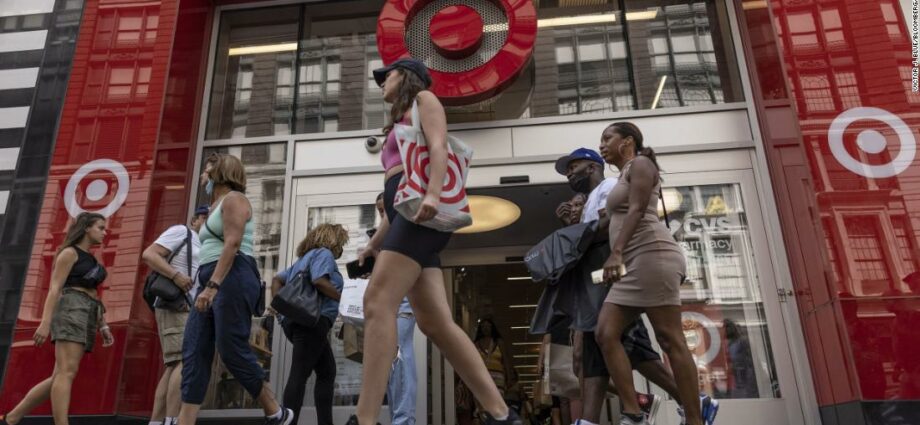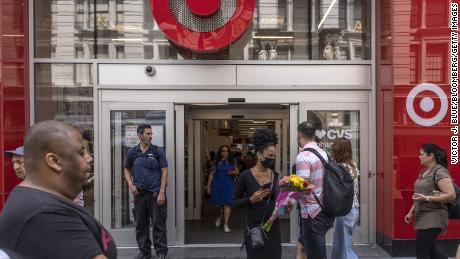New York (CNN Business)Target just demonstrated how quickly things can change in the world of retail, posting a terrible quarter after nearly two years of soaring profits and record revenue growth. But the big box retailer is promising things will change in the other direction just as fast.
Target was widely seen as one of the winners of the pandemic, gaining new customers as shoppers not wanting to go into brick-and-mortar stores were drawn to its growing curbside pickup and home delivery.
But after a disappointing fiscal first quarter when profits fell 40%, Target just had an even worse second quarter. Profits plunged 90% compared to a year earlier.
Inflation-weary shoppers shifted to buying essentials such as food and gas rather than “nonessential” general merchandise that is central to Target’s sales and profits. It was a stark contrast to larger rival Walmart (WMT), which posted only a narrow drop in profits for the quarter.
But many analysts believe Target is still in good position going forward, that it’s not at risk of joining some of the other pandemic winners who are now struggling, like online retailer Wayfair (W). Friday it announced it had to cut 5% of the staff due to expanding too fast during the good times.
Target’s profit plunge came from the deep discounts it had to offer on much of its general merchandise, such as clothing, electronics and home goods. The hit to earnings from such deep discounting was unavoidable. But company executives insist it was the right choice.
“Consider the alternative: we could have held on to excess inventory and attempted to deal with it slowly, over multiple quarters or even years. While that might have reduced the near-term financial impact, it would have held back our business over time,” said CEO Brian Cornell to investors. “The vast majority of the financial impact of these inventory actions is now behind us.” He predicts a meaningful improvement in operating margin rates in the fall season.
Many analysts agree that Target did the right thing taking the hit. Several say the sudden shift in consumer buying habits was not the fault of miscalculation by management.
“All last year the supply chain was very, very tight. Stores were out of stock of many items. They were ordering for a level of demand that was very reasonable,” said Bobby Griffin, retail analyst at Raymond James. “Then there was a very fast change in consumer behavior.”
Discretionary purchases being made by consumers shifted away from goods to things like travel, Griffin said.
Other experts say that Target management wasn’t quite blameless for being caught with too much of the wrong inventory.
“My sense is that this [problem at Target] was 70% about consumer behavior and 30% miscalculation related to inventory,” said Eric Schiffer, chief investment officer of Los Angeles-based private equity firm, The Patriarch Organization.
There is some hope for all retailers that they could benefit from the large, steady decline in gas prices over the last two months.
The national average price of gasoline has dropped $1.11, or 22% to $3.91 since hitting a record of $5.02 on June 14. It has fallen every day since. That should save households $100 a month on average. And wholesale gasoline futures point to even lower gas prices ahead in the coming weeks and months.
Target was always going to have more problems with a sudden shift in consumer spending than Walmart. Walmart has more than half of its sales from grocery while Target is closer to 20% said Owen Chen, retail analyst at Cowen. Walmart also had to offer sales on its nonessential general merchandise in the quarter.
And Walmart has always competed more on low prices, an advantage at a time that even middle and higher income shoppers are concerned about higher prices. Walmart executives reported it saw more business from those upper income households in the most recent quarter, a statement that cheered its investors.
But Chen said the numbers indicate that they did not get those higher income shoppers from Target’s traditional customers.
“I think that Target’s [store] traffic numbers show it did a good job holding onto their customers,” he said. The number of customers making purchases at Target was up 2.7% compared to a year ago in the just-completed quarter. And that’s more than a 20% increase since the same period of 2019, ahead of the pandemic.
Target shares have underperformed some of its rivals, falling 28% so far this year, compared to only a 5% decline at Walmart. Schiffer said he wouldn’t be surprised to see the slide in Target shares continue, as he believes they are overvalued by as much as 30%. But he doesn’t think that means Target is badly positioned for the future.
“I would stay the course,” he said. “The pace of growth during the pandemic was never going to be sustainable. They’ll still grow, just not as fast.”
Source: Read Full Article
-
Paramount+ To Be Bundled With Walmart+ Subscriptions
-
YouTube TV Passes 5 Million Subscriber Mark, Including Free Trials, Five Years After Launch
-
Toshiba To Go Private As JIP-led Consortium's Tender Offer Succeeds
-
Lantheus Holdings Stock Slips 10% On Weak Q3 Outlook
-
FCC Chairwoman Jessica Rosenworcel Roots For Election To Help Break 2-2 Tie On Commission, But Defends Her Record In Running Deadlocked Regulatory Body: “We’ve Turned The Noise Down”


